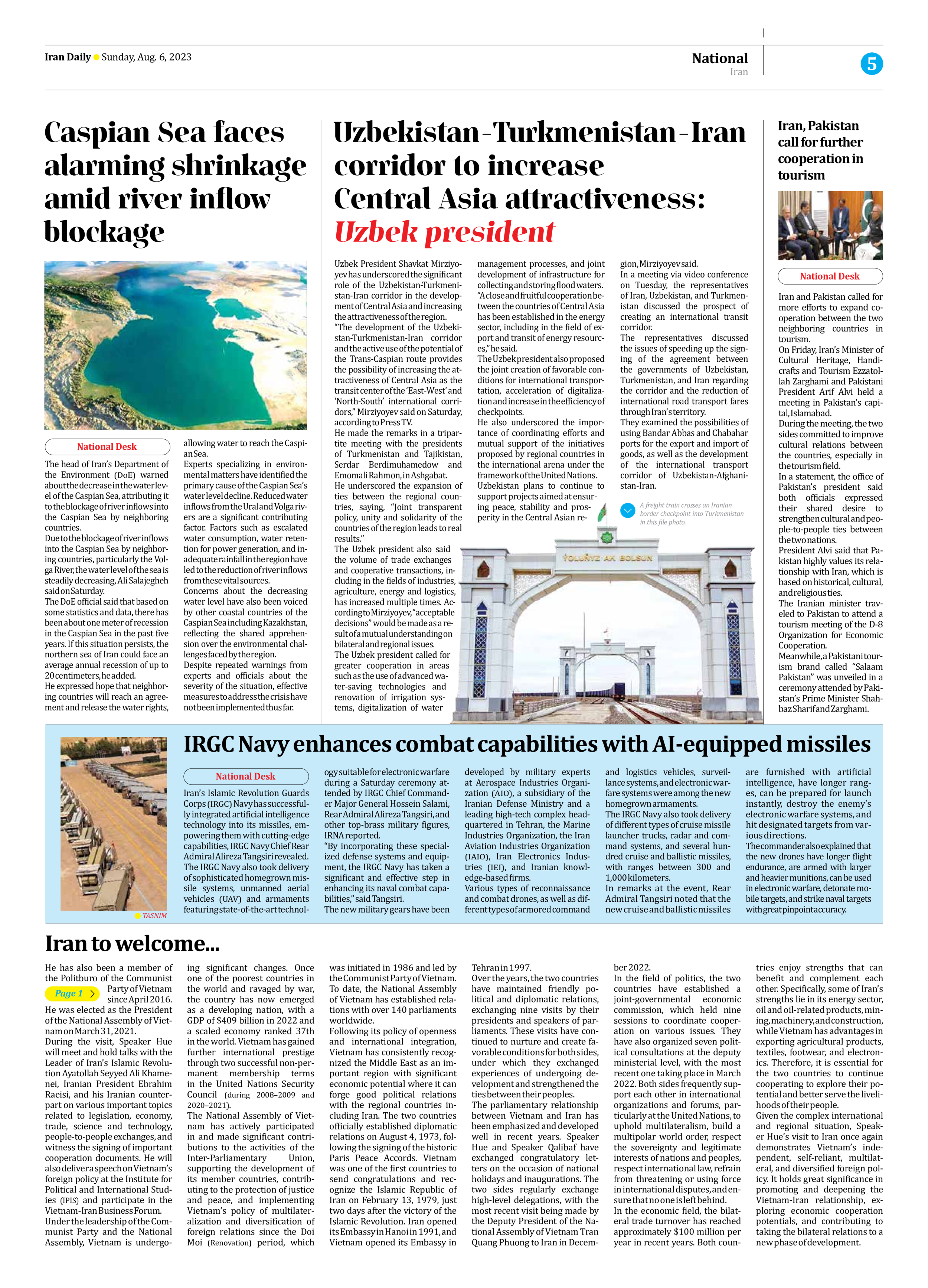
Iran to welcome...
Page 1
He has also been a member of the Politburo of the Communist Party of Vietnam since April 2016. He was elected as the President of the National Assembly of Vietnam on March 31, 2021.
During the visit, Speaker Hue will meet and hold talks with the Leader of Iran’s Islamic Revolution Ayatollah Seyyed Ali Khamenei, Iranian President Ebrahim Raeisi, and his Iranian counterpart on various important topics related to legislation, economy, trade, science and technology, people-to-people exchanges, and witness the signing of important cooperation documents. He will also deliver a speech on Vietnam’s foreign policy at the Institute for Political and International Studies (IPIS) and participate in the Vietnam-Iran Business Forum.
Under the leadership of the Communist Party and the National Assembly, Vietnam is undergoing significant changes. Once one of the poorest countries in the world and ravaged by war, the country has now emerged as a developing nation, with a GDP of $409 billion in 2022 and a scaled economy ranked 37th in the world. Vietnam has gained further international prestige through two successful non-permanent membership terms in the United Nations Security Council (during 2008–2009 and 2020–2021).
The National Assembly of Vietnam has actively participated in and made significant contributions to the activities of the Inter-Parliamentary Union, supporting the development of its member countries, contributing to the protection of justice and peace, and implementing Vietnam’s policy of multilateralization and diversification of foreign relations since the Doi Moi (Renovation) period, which was initiated in 1986 and led by the Communist Party of Vietnam. To date, the National Assembly of Vietnam has established relations with over 140 parliaments worldwide.
Following its policy of openness and international integration, Vietnam has consistently recognized the Middle East as an important region with significant economic potential where it can forge good political relations with the regional countries including Iran. The two countries officially established diplomatic relations on August 4, 1973, following the signing of the historic Paris Peace Accords. Vietnam was one of the first countries to send congratulations and recognize the Islamic Republic of Iran on February 13, 1979, just two days after the victory of the Islamic Revolution. Iran opened its Embassy in Hanoi in 1991, and Vietnam opened its Embassy in Tehran in 1997.
Over the years, the two countries have maintained friendly political and diplomatic relations, exchanging nine visits by their presidents and speakers of parliaments. These visits have continued to nurture and create favorable conditions for both sides, under which they exchanged experiences of undergoing development and strengthened the ties between their peoples.
The parliamentary relationship between Vietnam and Iran has been emphasized and developed well in recent years. Speaker Hue and Speaker Qalibaf have exchanged congratulatory letters on the occasion of national holidays and inaugurations. The two sides regularly exchange high-level delegations, with the most recent visit being made by the Deputy President of the National Assembly of Vietnam Tran Quang Phuong to Iran in December 2022.
In the field of politics, the two countries have established a joint-governmental economic commission, which held nine sessions to coordinate cooperation on various issues. They have also organized seven political consultations at the deputy ministerial level, with the most recent one taking place in March 2022. Both sides frequently support each other in international organizations and forums, particularly at the United Nations, to uphold multilateralism, build a multipolar world order, respect the sovereignty and legitimate interests of nations and peoples, respect international law, refrain from threatening or using force in international disputes, and ensure that no one is left behind.
In the economic field, the bilateral trade turnover has reached approximately $100 million per year in recent years. Both countries enjoy strengths that can benefit and complement each other. Specifically, some of Iran’s strengths lie in its energy sector, oil and oil-related products, mining, machinery, and construction, while Vietnam has advantages in exporting agricultural products, textiles, footwear, and electronics. Therefore, it is essential for the two countries to continue cooperating to explore their potential and better serve the livelihoods of their people.
Given the complex international and regional situation, Speaker Hue’s visit to Iran once again demonstrates Vietnam’s independent, self-reliant, multilateral, and diversified foreign policy. It holds great significance in promoting and deepening the Vietnam-Iran relationship, exploring economic cooperation potentials, and contributing to taking the bilateral relations to a new phase of development.







